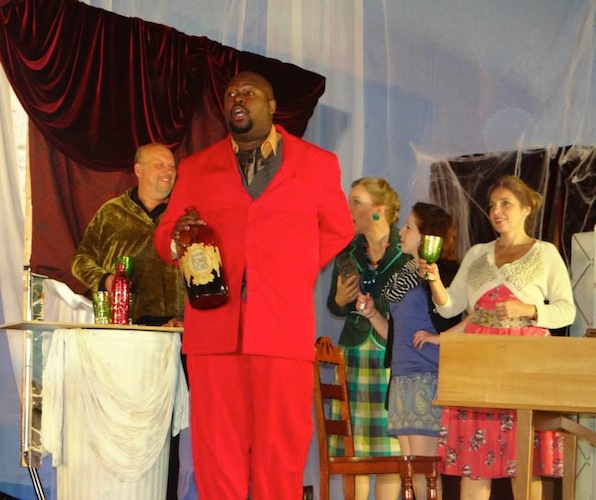Fuse Concert Preview: Commonwealth Lyric Theater’s “Mozart and Salieri”
Thanks to CLT’s pluck and commitment to underperformed repertoire, Boston audiences have the chance to check out the rarely performed opera “Mozart and Salieri” for themselves.

Pawel Izdebski, RaShaun Campbell, Emily Thorner and Julia Jaffe in rehearsal for the Commonwealth Lyric Theater production of “Mozart and Salieri.”
By Jonathan Blumhofer
In recent seasons, one or two weeks in June tend to be particularly rich for opera performances in the greater Boston area, and this year is no different: in addition to Odyssey Opera’s two productions next week (of works by Verdi, Mascagni, and Wolf-Ferrari), Commonwealth Lyric Theater (CLT) returns to action at Brighton’s Center Makor with Nikolai Rimsky-Korsakov’s rarely-heard one-acter, Mozart and Salieri, on June 8th, 10th, and 11th.
If you’ve seen Peter Shaffer’s play Amadeus (or its film adaptation), you basically know the plot: Salieri, envious of Mozart’s genius, poisons him. But you’ll probably be surprised by the music. Rimsky, who’s best known for pieces showcasing sumptuous orchestral colors and dazzling exoticism (like Sheherezade and the Legend of the Invisible City of Kitezh), turned in a score here that’s dark and ruminative. Snatches of Mozart’s music turn up from time to time. Harlow Robinson called the mood “Dostoevskian,” and that’s not far off the mark.
For his libretto, Rimsky turned to Russia’s greatest poet, Alexander Pushkin, who, in 1830, had written a “small tragedy” called Mozart and Salieri. Rimsky’s operatic setting incorporates nearly all of Pushkin’s text, making its running time of almost forty minutes all the more remarkable: consider, by comparison, Richard Strauss’s heavily edited word-for-word adaptation of Oscar Wilde’s Salome, which clocks in at nearly ninety minutes.
Of course, Pushkin’s play is intentionally less ambitious in scope than Wilde’s. In it, there are only the two characters of the title. Salieri spends much of the time onstage, often reminiscing. In the opera, the chorus’s action is limited to singing offstage and only at the end of the opera’s second scene: in one of Rimsky’s great, dramatic strokes, the chorus intones the opening of Mozart’s Requiem as he expires onstage.
CLT’s cast features its by now standard mix of international and local talent. Bass Mikhail Svetlov, who’s sung at the Bolshoi Theater and Metropolitan Opera, shares the role of Salieri with CLT artistic director Alexander Prokhorov. And tenors Mikhail Yanenko and Jonathan Price exchange the part of Mozart. Zachary Schwartzman conducts the singers and orchestra.
Owing to its brevity, performances of Mozart and Salieri typically include some other component, often music by (who else?) Mozart and Salieri. CLT’s production is taking a creative tack with a newly crafted “Intermezzo” consisting of favorite Mozart opera melodies that will showcase eight solo singers from CLT and several children from the “Lucky Ten” Young Talent Studio.
When it premiered in 1898 with the legendary Feodor Chaliapin singing the villain, Mozart and Salieri seemed destined for great things. Alas, that wasn’t to be, though the music is as striking and persuasive as anything in Rimsky’s catalogue. Now, thanks to CLT’s pluck and commitment to underperformed repertoire, Boston audiences have the chance to check it out for themselves. It’s a promising way to start off the summer concert season, if ever there was one.
Jonathan Blumhofer is a composer and violist who has been active in the greater Boston area since 2004. His music has received numerous awards and been performed by various ensembles, including the American Composers Orchestra, Kiev Philharmonic, Camerata Chicago, Xanthos Ensemble, and Juventas New Music Group. Since receiving his doctorate from Boston University in 2010, Jon has taught at Clark University, Worcester Polytechnic Institute, and online for the University of Phoenix, in addition to writing music criticism for the Worcester Telegram & Gazette.
